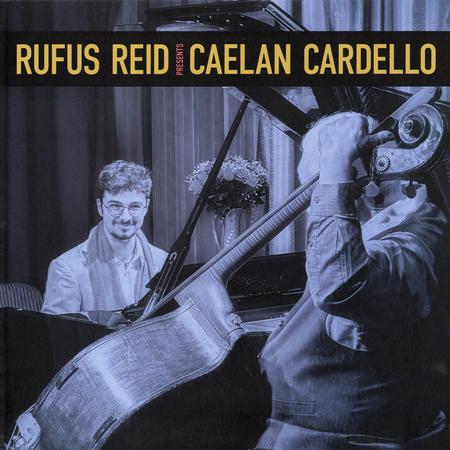A New Young Lion of Jazz
Caelan Cardello teams up with Rufus Reid for his maiden album
“Say hello to Caelan Cardello,” Rufus Reid, whose voice sounds about as deep as his upright bass, announces midway through the first side of this album. Hello, Caelan! And congratulations!
This wonderful LP, the first that Cardello has recorded, arrived a few months ago and has been in regular rotation, as the saying goes, on my TechDas Air Force Zero. Hand-delivered to me in Washington, DC by Michael Fremer--the proprietor of this website, veteran audio reviewer and impassioned follower of all things political (he probably rings me at least once a day to expostulate about some fresh outrage that has been perpetrated in the corridors of power in Washington)—it features a joint performance by Reid and Cardello that took place at the Klavierhaus in New York this past January.
As he listened that evening, Fremer expressed his chagrin to his chum Robin Wyatt, a high-end stereo dealer based in New Jersey, that the concert wasn’t being recorded. The redoubtable Wyatt didn’t miss a beat, as it were. “But it is,” Wyatt responded. “Our friend Duke Marcos is back there catching it all at 96/24.” And a very good thing that he did. The recording is top-flight and was mastered by none other than Bob Ludwig who has now retired after decades of valorous service in the engineering trenches. This is one of his last efforts and the sonic results, it must be said, are quite stellar.
Jazz has a long history of performers hitting the big-time at a tender age. Earl Hines joining Lois Deppe and His Symphonian Serenaders at age 17. Louis Armstrong playing with Fate Marable on a New Orleans riverboat as a teenager. And in 1956 there was the wunderkind Lee Morgan joining the Dizzy Gillespie Big Band and cutting his first album at age 18. And so on.
I don’t know if the twenty-two-year-old Cardello, who has been tickling the ivories since he was a tyke, will reach those lofty heights, but if his maiden album is anything to go by, he’s got a darned good shot--oodles of talent annealed to an expansive musical imagination.
For my money, Cardello can swing with the best of them—on the song “Mean What You Say,” which was composed by Thad Jones, Cardello lets it rip. But he also has a delicately nuanced side that manifests itself on lovely numbers such as Cedar Walton’s “Bolivia” and Rufus Reid’s “It’s the Nights I Like.” There’s a shimmering, gossamer-like quality to the latter song that immediately captures your heart. Cardello’s refined and elegant playing on the Klavierhaus’ Fazioli Grand is a pleasure to listen to over and over.
What about jazz icon Reid? I often have quibbles, if not quarrels, about the way upright double bass is recorded on jazz albums. Put bluntly, it tends to sound muddy, like trudging through a field after a rainstorm. I’m pleased to report that there was none of that on this LP. Quite the contrary. Whether I was employing the solid-state Dartzeel NHB-468 or the SET Octave Jubilee monoblock amplifiers on my Avantgarde Trio G3 loudspeakers, I was more than satisfied with the solidity and resonance of the bass reproduction. In truth, I was wowed.
Even Fremer, who seems to regard horn loudspeakers with something between resignation and outright horror, was impressed by the reproduction on “Bolivia” when he heard my rig here in Washington, DC. The sound was big, lavish, opulent. And silky. Fremer, who served as the album’s executive producer, is rightly proud of it.
Reid’s own pride in Cardello’s musical prowess is obvious. On the final cut on side 1, “The Whims of Chambers,” they dig deep into the blues, knowing, as Reid puts it, that they would be wholly remiss not to tackle them during a jazz concert. Uniting an old master and a rising young star, this album has its moments of whimsy, but is above all a profound exploration of jazz traditions played with conviction and flair.










































.png)








